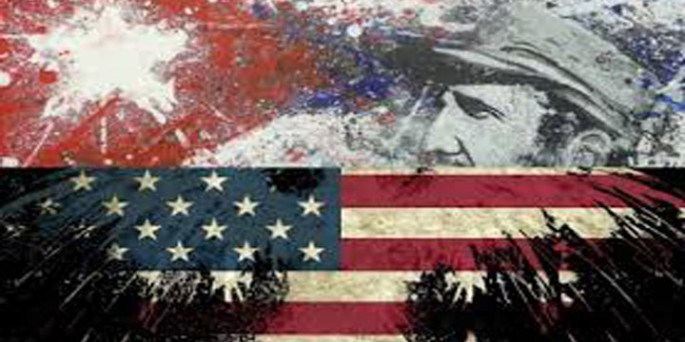
Chomsky on Cuba: After decades of meddling, “terrorism,” restoring ties is least we could do
The United States and Cuba have held a second round of talks as part of the effort to restore full diplomatic ties for the first time in more than half a century. The two sides could reopen embassies in Havana and Washington in time for a regional meeting next month. World-renowned political analyst and linguist Noam Chomsky welcomes President Obama’s decision to begin normalizing relations with Cuba, but cautions that after more than half a century of U.S. meddling in the island nation, it’s the minimum step he could take.
Transcript
This is a rush transcript. Copy may not be in its final form.
AMY GOODMAN: As we continue our conversation with Noam Chomsky, we turn now to Latin America.Democracy Now!’s Aaron Maté sat down with Noam Chomsky yesterday on Democracy Now!, the MITprofessor emeritus. We asked him to talk about the thawing of U.S.-Cuba relations and U.S. meddling in Cuba.
NOAM CHOMSKY: The U.S. has been at war with Cuba since late 1959. Cuba was—had been, essentially, a colony of the United States, a virtual colony. In January 1959, the Castro guerrilla forces took over. By late that year, around October, U.S. planes were already bombing Cuba from Florida. In, I think it was, March 1960, there was a formal decision internally to overthrow the government. John F. Kennedy came in shortly after, got the Bay of Pigs. After the Bay of Pigs, there was almost hysteria in Washington about how to punish the Cubans for this. Kennedy made some incredible speeches about how, you know, the future of the world is at stake in dealing with Cuba and so on. The U.S. launched a major terrorist war against Cuba. We kind of downplay it, and what you can get reported is CIA attempts, you know, to kill Castro—bad enough—but that was a very minor part of it. Major terrorist war is part of the background for the missile crisis, which almost led to a terminal nuclear war. Right after the crisis, the terrorist war picked up again.
Meanwhile, the sanctions have been very harsh sanctions against Cuba, right from the Eisenhower regime, picked up, extended by Kennedy, extended further under Clinton, who actually outflanked Bush from the right on extending the sanctions. The world has been totally opposed to this. The votes at the General Assembly—you can’t do it at the Security Council because the U.S. vetoes everything, but at the General Assembly, the votes are just overwhelming. I think the last one was 182 to two, you know, U.S. and Israel, and sometimes they pick up Papua or something like that. This has been going on year after year. The U.S. is utterly isolated, not just on this issue, many others.
Finally, notice that Obama didn’t end the sanctions. In fact, he didn’t even end the restrictions, many of the restrictions on travel and so on. They made a mild gesture towards moving towards normalization of relations. That’s presented here—the way it’s presented here is, we have to test Cuba to see if our long—as Obama put it, our efforts to improve the situation in Cuba have failed, right? Big efforts to improve the situation—terrorism, sanctions. The sanctions are really incredible. So, if, say, Sweden was sending medical equipment somewhere which had Cuban nickel in it, that had to be banned, you know, things like that.
AMY GOODMAN: And terrorism, you mean?
NOAM CHOMSKY: Terrorism just—it went on into the ’90s. The worst part was under Kennedy, then picked up again in the late ’70s and so on. Major terrorists are provided refuge in Florida. The late Bosch is one, Orlando Bosch. Posada is another. You remember there was something called the Bush Doctrine, Bush II: A country that harbors terrorists is the same as the terrorists themselves. That’s for others, not for us. We harbor them and also support their activities.
But we have to test Cuba to see if they’re making successful gestures, now that our old policy of bringing freedom and democracy didn’t work, so we have to try a new policy. I mean, the irony of this is almost indescribable. The fact that these words can be said is shocking. It’s a sign of, again, a failure to reach a minimal level of civilized awareness and behavior. But the steps—I mean, it’s good that there are small steps being taken. It’s interesting to see what the Cuban intellectual community—there is a dissident intellectual community in Cuba—how they’ve been reacting to it. Actually, there’s an interesting article about it by my daughter, Avi Chomsky, who’s a Cuba specialist. But we don’t look at that. We don’t hear what they’re saying.
AMY GOODMAN: What are they saying?
NOAM CHOMSKY: What they’re saying is approximately what I was just saying: You know, it’s a good step that the U.S. is beginning to move, but they’ve got to begin to face up to the reality of what’s been happening, which is that the U.S. has been attacking Cuba. And the reason for—the primary reason, probably, for Obama’s slight moves are that the U.S. was becoming completely isolated in the hemisphere. It’s not just that the world is opposed, the hemisphere is opposed. And that’s a remarkable development.
(From: Democracy Now)

